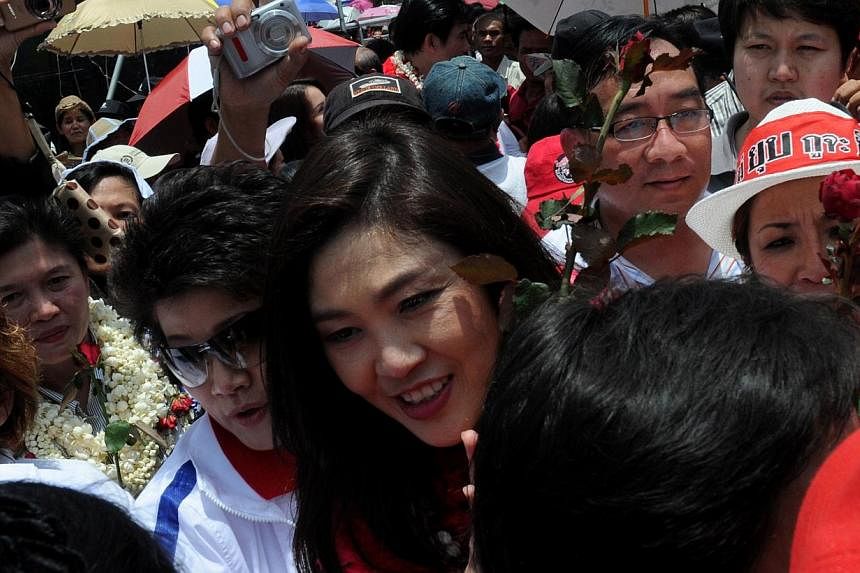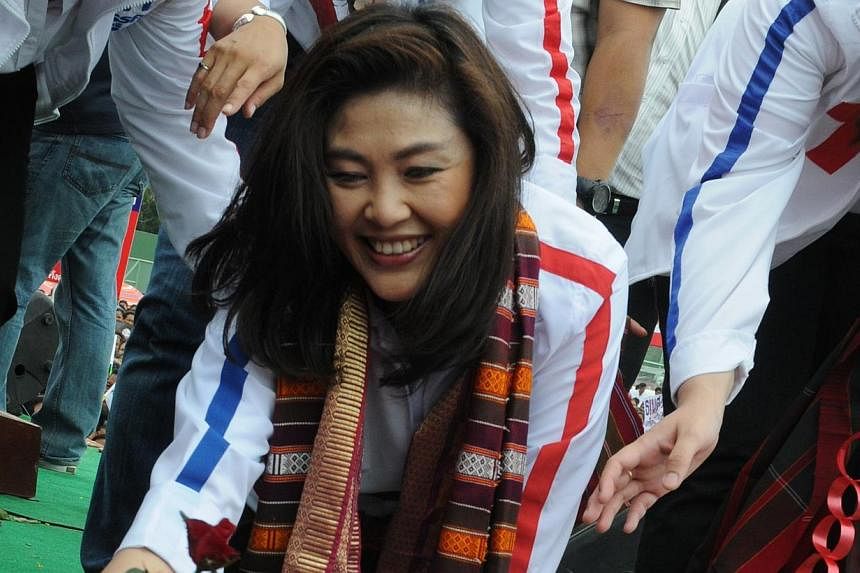It was the middle of May in 2011 - and searingly hot in the northern Thai town of Phayao, which was built around a lake, with low, rolling hills on the horizon.
Standing on an uncovered wooden stage in a park was the billionaire Thaksin Shinawatra's ace - his fresh-faced youngest sister Yingluck. Ousted as premier in 2006 and living in self-exile abroad to avoid a jail sentence for graft, Mr Thaksin was plotting a political comeback for his faction through his sister.
Just days after being nominated as the Thaksin-backed Puea Thai Party's prime ministerial candidate, Ms Yingluck was addressing her first-ever political rally.
Under the blazing sun, with a small sea of red-shirt-clad people before her, Ms Yingluck, more used to corporate boardrooms, took her cue from talking points on a sheet of paper on the lectern in front of her.
Her voice was hesitant and there were some awkward pauses. But the crowd had been warmed up for an hour by the fiery pro-Thaksin "red shirt" leader Nattawut Saikua, and this was the main act - so they were curious. Nobody knew much about her, except that she had been running some units of the Shinawatra family's corporate empire.
So they gave her a chance. And when she appeared to shed a tear as she asked for their support, they roared.
The tall and attractive mother of one got better at it as the election campaign progressed. The routine became set - a rousing speech by Mr Nattawut, then Ms Yingluck arriving with a long-drawn out, girlish "Sawasdee kaaaaaaa" or "hello", and the crowd erupting in cheers. It was quite clear, judging by her popularity, that the Puea Thai Party was going to win the election in July - and they did, by a landslide. Ms Yingluck was duly installed as Prime Minister.
At the age of 44, she was the country's first woman premier - not a bad achievement for an untested political novice, albeit with strong backing.
In her years in office, her performance was mixed, but she kept her hat on and stayed popular with her supporters. Soon after taking office, she was faced with a devastating flood disaster that caused huge economic damage - and a dent in the image of the new premier and her government for not acting swiftly and decisively enough. She was also laughed at by Thailand's urban middle and upper classes for her mangled English.
With many among them convinced that her brother is a closet Republican bent on leveraging electoral democracy to erode the power of the monarchy itself, they accused her of being his puppet. The Puea Thai Party's rice purchase scheme, which paid farmers well over world prices for their harvest, was seen as a profligate disaster. But she seemed to get on well with the military, including then army chief General Prayut Chan-ocha.
Then in 2013, an ill-timed bid for amnesty for her brother - which many insiders claim was the result of a deal which turned out to be an elaborate trap by political foes - provided an excuse for massive street protests against her government.
The protests by Bangkok's royalist middle class and elites, paralysed the government and pushed the country close to a repeat of the armed conflict of 2010 that had seen almost 100 people killed, mostly in the streets of Bangkok. The beleaguered Ms Yingluck was not seen to smile much at her occasional interviews with journalists in Government House, which she eventually had to abandon to the protesters. In May last year, she was disqualified from office by the constitutional court; in just days the coup d'etat followed.
Last Friday, she was impeached by a legislative assembly handpicked by the military regime. She is now banned from politics for five years, and also faces a separate criminal charge which could see her fined or jailed. Some in her circle say the regime may also go after her assets as it seeks to bury her as a political threat.
But just as the royalist army turned her brother into an accidental icon of democracy in going after him, they may be doing so with their treatment of his sister.
Mr Thaksin, the telecoms tycoon who swept to power in 2001 on cash handouts, astute marketing and generous promises, won again in 2005 and bragged about staying in power for 20 years. But his ambition and his populist government that drew support from the rural north and north east did not sit well with the royalists and old urban elites, leading to his ouster in a coup in 2006.
Mr Thaksin was never seen as a champion of liberal democracy, once famously comparing democracy to a Rolls Royce when a pickup truck would do.
But after his ouster by the military as a democratically elected leader, he came to be seen as a crusader of democracy by his followers, continuing to field proxy parties to contest elections. Mr Thaksin played the part, driving the new vehicle to a win for his sister in 2011.
But it was all to unravel.
At the centre of the current drama is Puea Thai's rice purchase scheme, with Ms Yingluck accused of being negligent in allowing it to continue - the reason for her impeachment.
The criminal charges against her will focus on potential corruption.
Critics have bashed the scheme, saying it was Puea Thai's way of bartering billions of baht from the treasury in return for votes. It is estimated to have cost more than 500 billion baht (S$20.65 billion) and left the government with a huge stockpile of rice, estimated at 17.7 million tonnes, that cannot be sold except at a crushing loss. Many farmers were paid for the grain, but many were also not paid for months, pointing to mismanagement and leading to talk of corruption.
But on live television before the National Legislative Assembly (NLA) as she mounted her defence, Ms Yingluck, reading from a prepared speech, played to the gallery not in Bangkok but in the ricefields of the north the north east, to the rice farmers who are Puea Thai's support base.
She stood by the scheme, saying she was proud of having helped poor farmers, whom she now felt sorry for as they would be returning to a life of poverty and debt.
Later that day, after the handpicked NLA had voted overwhelmingly, 190-18 for her impeachment - an outcome that sources say had been decided in advance - soldiers appeared at the SC Park Hotel where Puea Thai had planned to hold a press conference. Alarmed, the hotel manager called the party to cancel it.
Ms Yingluck than released her statement on Facebook, saying: "Today, democracy has died, along with the rule of law." Social media was flooded with comment, both for and against the impeachment.
Thai politics is a winner-take-all game, and the sun is dipping on the political fortunes of the Shinawatra family.
But it is not quite setting yet. Thaksin has proven his tenacity, and his popularity with his power base remains strong. To the masses that voted her to power, Ms Yingluck has now become the latest symbol of the domination of the political system by Bangkok's royalist elites backed by the army.
There is much speculation now in political circles on what will be revealed in the course of the criminal case - and whether if found guilty and given a jail sentence, Ms Yingluck would leave the country.
Jail time may turn her into even more of a martyr for her supporters.
"I don't think they will put her in jail," a party insider said. "They would be stupid to do that."



